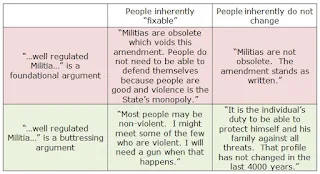“A well regulated Militia, being necessary to the security of a free State, the right of the people to keep and bear Arms, shall not be infringed.”
As a pro-Second Amendment blogger, I only need to address
the box which starts….”Militias are
obsolete…” because that is the only position which attempts to invalidate
my right to bear arms. That position, “Militias
are obsolete… foundational argument” contends that the Second Amendment is about “Militias”
and not about firearms.
There are two assumptions about this position that are worth
examining:
Militias are obsolete:
At this point it is useful to look at the Fifth Amendment to
get some hints on what the authors of the Bill of Rights had in mind when using
the word “Militia”.
“No
person shall be held to answer for a capital, or otherwise infamous crime,
unless on a presentment or indictment of a Grand Jury, except in cases
arising in the land or naval forces, or in the Militia, when in actual service
in time of War or public danger; nor shall any person be subject for the
same offence to be twice put in jeopardy of life or limb; nor shall be
compelled in any criminal case to be a witness against himself, nor be deprived
of life, liberty, or property, without due process of law; nor shall private
property be taken for public use, without just compensation.”
Take a look at the underlined portion:
…except
in cases arising in the land or naval forces, or in the Militia, when in actual
service in time of War or public danger…
The authors of the Bill of Rights gave us a list of “equivalences”
or “same-as”. In the Second Amendment
they use the generic term “security”, in the Fifth Amendment the explicitly say
land or naval
forces, or in the Militia, when in actual service in time of War or public
danger
So even if those who wish to ban guns contend Second
Amendment uses “Militias” as a foundational argument, the Fifth Amendment
equates the need for “Militias” with the need to address “public danger”.
And who, on August 8, 2014 would have picked an anonymous
suburb of St. Louis, Missouri as the next flashpoint for urban violence? My guess it that exactly ZERO in 317,000,000
would have picked Ferguson, Missouri as the next flashpoint.
The authors of the Fifth (and Second) Amendments were talking exactly about flash-mobs in
shopping mall parking lots when they wrote “public danger”.
The second assumption is that the Second Amendment is about
Militias, not arms:
If the Second Amendment is about Militias, then I should be
able to organize a militia and legally buy the tools of the trade. I should be able to buy, or manufacture for
general sale, belt-fed, crew served weapons.
I should be able to buy mortars.
Clearly I cannot even though I can own a firearm nearly any place
in the country. That is proof of a vast body of precedence that the courts (and
everybody else) realizes that the Second Amendment is NOT about Militias, it is
about the right to bear arms.
The perfectability of humans
One of the fundamental differences between progressives and conservatives is that progressives believe that humans are "fixable" and that the fixes are permanent and will never unwind. You can picture that as a rock dragged across a beach. It tends to stay where it was left.
Conservatives tend to believe that any improvements in the human condition are reversible and that inattention results in the a return to the base condition. Furthermore, conservatives believe that maintaining the improved human condition consumes energy and that ever more energy is required as the social construct becomes larger and more complex the structure. As some point, an equilibrium is reached where all resources are consumed in maintenance and small pertubations result in the entire structure collapsing.
The conservative might challenge the progressive: "Suppose I get a tattoo and my child and grandchild get identical tattoos...How many generations must get tattoos before babies are born with them?" The answer, of course, is "never". Then the conservative is likely to ask, "Then why do you assume that your social constructs will become maintenance free, that people will be born "fixed"?"
The perfectability of humans
One of the fundamental differences between progressives and conservatives is that progressives believe that humans are "fixable" and that the fixes are permanent and will never unwind. You can picture that as a rock dragged across a beach. It tends to stay where it was left.
Conservatives tend to believe that any improvements in the human condition are reversible and that inattention results in the a return to the base condition. Furthermore, conservatives believe that maintaining the improved human condition consumes energy and that ever more energy is required as the social construct becomes larger and more complex the structure. As some point, an equilibrium is reached where all resources are consumed in maintenance and small pertubations result in the entire structure collapsing.
The conservative might challenge the progressive: "Suppose I get a tattoo and my child and grandchild get identical tattoos...How many generations must get tattoos before babies are born with them?" The answer, of course, is "never". Then the conservative is likely to ask, "Then why do you assume that your social constructs will become maintenance free, that people will be born "fixed"?"



That last paragraph IS an excellent approach to take! :-)
ReplyDelete